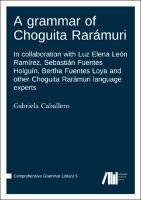A grammar of Choguita Rarámuri
In collaboration with Luz Elena León Ramírez, Sebastián Fuentes Holguín, Bertha Fuentes Loya and other Choguita Rarámuri language experts
Author(s)
Caballero, Gabriela
Collection
Knowledge Unlatched (KU)Language
EnglishAbstract
This book provides the first comprehensive grammatical description of Choguita Rarámuri, a Uto-Aztecan language spoken in the Sierra Tarahumara, a mountainous range in the northern Mexican state of Chihuahua belonging to the Sierra Madre Occidental. A documentary corpus developed between 2003 and 2018 with Choguita Rarámuri language experts informs the analysis and is the source of the examples presented in this grammar. The documentary corpus, which consists of over 200 hours of recordings of elicited data, narratives, conversations, interviews, and other speech genres, is available in two archival collections housed at the Endangered Languages Archive and at UC Berkeley’s Survey of California and Other Indian Languages. Choguita Rarámuri is a highly synthetic, agglutinating language with a complex morphological system. It displays many of the recurrent structural features documented across Uto-Aztecan, including a predominance of suffixation, head-marking, and patterns of noun-incorporation and compounding (Sapir 1921; Whorf 1935; Haugen 2008b). Other features of typological and theoretical interest include a complex word prosodic system, a wide range of morphologically conditioned phonological processes, and patterns of variable affix order and multiple exponence. Choguita Rarámuri is also of great comparative/historical importance: while several analytical works of Uto-Aztecan languages of Northern Mexico have been produced in the last years (Guerrero Valenzuela 2006, García Salido 2014, Reyes Taboada 2014, Morales Moreno 2016, Villalpando Quiñonez 2019, inter alia), many varieties still lack comprehensive linguistic description and documentation.
Keywords
Language Arts & Disciplines; LinguisticsDOI
10.5281/zenodo.7189161ISBN
9783985540570, 9783961103997, 9783961103997Publisher
Language Science PressPublisher website
https://langsci-press.org/Publication date and place
2022Imprint
Language Science PressClassification
Linguistics


 Download
Download